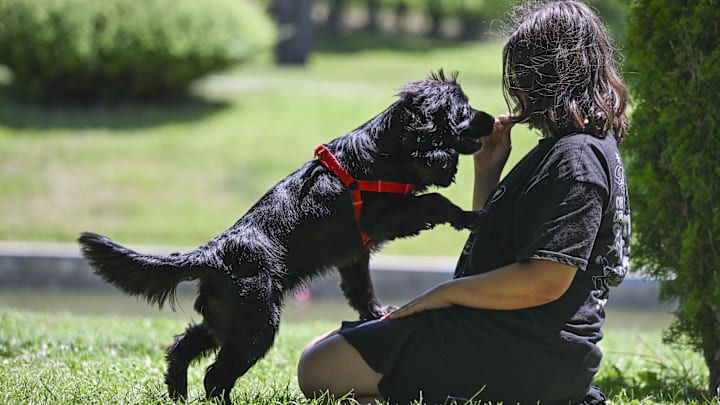Can dogs smell your stress? Absolutely, and it’s just one of the many remarkable ways dogs connect with their owners. Your dog is more than just a loyal companion. They’re incredibly attuned to your emotional state. Whether through detecting subtle changes in your body language, dogs can sense when you’re stressed.
They can even smell changes in your sweat and pheromones, which indicate your stress levels. This special bond between you and your dog means they always look out for you, providing comfort and support when needed.
The Human-Dog Bond
Nearly all American pet owners (97%) consider their pets part of their family. This reflects a deep emotional connection that goes beyond primary care. You invest in your dog’s needs, ensuring they have food, shelter and a comfortable home environment. For example, many pet owners choose pet-friendly artificial grass to minimize maintenance and keep their homes clean and orderly.
This level of care and attention strengthens the bond between you and your dog, allowing them to be deeply attuned to your emotional states. This bond means your dog can sense when you’re stressed, anxious or sad. They often react with comforting behaviors like staying close, nuzzling or offering a paw.
Can Dogs Smell Your Stress?
Dogs possess heightened senses that allow them to detect subtle changes in their environment and you. A study suggests that dogs have a 93.75% accuracy in sensing when humans experience stress through odor. This keen sense of smell and their acute ability to read body language and voice tone make them exceptional at sensing your emotional state.
These sensory abilities are crucial in their role as your companion and protector. They provide emotional support by recognizing when you’re stressed or anxious and reacting in ways that can help comfort and calm you.
How Dogs Can Detect Stress in Humans
Understanding how dogs detect human stress can deepen your bond with your furry friend. By recognizing the subtle cues your dog picks up on, you can better appreciate their role in your emotional well-being.
1. Changes in Body Language
Dogs notice when you exhibit anxious body language — such as fidgeting or pacing — because they often display similar behaviors when stressed. Like you, dogs can pace back and forth when they struggle to relax or when something in their environment causes problems.
By observing these behaviors, your dog empathizes with your anxiety and often tries to offer comfort by staying close or showing affection. Recognizing this mutual behavior can help you understand how deeply your emotions impact your dog and vice versa.
2. Behavioral Changes in the Owner
Dogs observe changes in your daily routines or habits that may signal stress, such as skipping walks or altered sleeping patterns. They are incredibly attuned to these shifts and often respond by trying to comfort you.
Engaging with your dog through petting and playing reassures them and benefits you by releasing oxytocin. This hormone promotes positive feelings and reduces stress. This mutual interaction strengthens your bond and helps both of you feel more relaxed and connected.
3. Changes in Voice Tone
Dogs are sensitive to changes in your tone and can detect stress when your voice becomes higher pitched or shaky. They instinctively pick up on these auditory cues, recognizing something is amiss.
When your dog hears these changes, it may respond by becoming more attentive, staying close or trying to comfort you. Understanding this sensitivity can help you manage your stress better, knowing your dog will always support you through those challenging moments.
4. Changes in Breathing Patterns
Dogs can detect irregular breathing patterns — such as rapid or shallow breathing — which often accompany stress. This ability is particularly beneficial, as studies have found that ex-responders diagnosed with PTSD who have service dogs experience significantly fewer PTSD-related symptoms, better sleep quality and improved overall well-being.
When your dog senses changes in your breathing, it may respond by providing comfort and support to help you calm down. This connection highlights your dog's incredible sensitivity. It demonstrates the profound impact they can have on your mental and emotional health.
5. Eye Contact and Facial Expressions
Dogs are adept at reading your facial expressions and can sense stress when you have furrowed brows or a tense face. They notice these subtle changes and understand you might feel anxious or upset.
Your dog may respond by nuzzling you, licking your face or simply staying close to offer comfort. Recognizing how your expressions impact your dog can help you be more mindful of your emotions and appreciate your furry friend's support.
6. Posture Changes
Dogs recognize changes in your posture — like slumping or tense shoulders — which are clear stress indicators. When your posture changes, your dog often responds by offering comfort or trying to get your attention.
Proper posture is essential for your body to function more normally, aiding digestion, circulation and breathing. Staying aware of your posture allows you to help yourself, reduces stress signals your dog picks up on and creates a more relaxed environment for both of you.
Recognizing When Dogs Smell Your Stress
Paying attention to your dog's signals is crucial for your well-being and that of your dog. Nurture your bond by being mindful of your stress levels and appreciating your dog's comfort and support.
